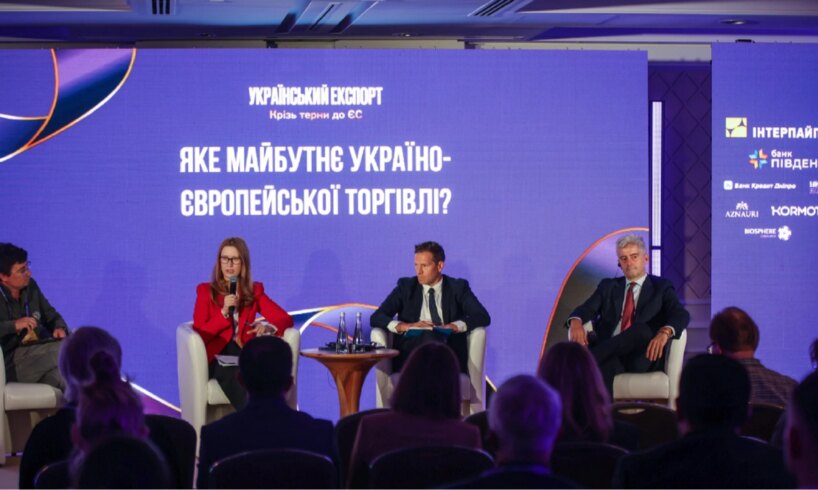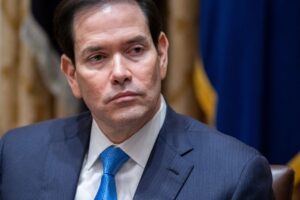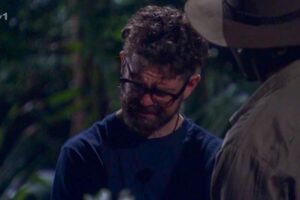
This year’s export forum – the third held by the two media outlets – was titled “Through Thorns to the EU”. The discussion focused on trade relations with the European Union, as well as the challenges and opportunities faced by Ukrainian exporters.
As in previous years, the event brought together representatives of the government, business, and international institutions. Among the participants were Gediminas Navickas, Deputy Head of the EU Delegation to Ukraine; Roksolana Pidlasa, Head of the Budget Committee of the Verkhovna Rada (Ukrainian Parliament); Matteo Rivellini, Head of the Ukraine Investment Team at the European Investment Bank (EIB); Karin Karlsbro, Member of the European Parliament; Hennadii Chyzhykov, President of the Ukrainian Chamber of Commerce and Industry; and representatives of ArcelorMittal, Interpipe, Biosphere, and the agricultural and financial sectors.
Amid a recent announcement that Ukraine is set to launch arms exports, the event was also attended by representatives of the defence industry.
Advertisement:
The forum was opened by Sevğil Musaieva, Editor-in-chief of Ukrainska Pravda, together with Mykola Maksymchuk, Editor of Ekonomichna Pravda, and Sergiy Sydorenko, Editor of European Pravda.
Sevğil Musaieva, Sergiy Sydorenko and Mykola Maksymchuk
In the opening discussion, Sergiy Sydorenko, Roksolana Pidlasa, Gediminas Navickas and Matteo Rivellini talked about the future of trade between Ukraine and the European Union.
In response to a question from Sydorenko about Ukraine’s role in European trade, Gediminas Navickas said Ukraine is an advantage, not a problem, for the EU economy.
“We are currently finalising another agreement with Ukraine that will open additional tariff quotas, including for agricultural products. The agreement must be based on equal conditions. Not all European farmers are happy about this, which is understandable,” he said.
Gediminas Navickas, Deputy Head of the EU Delegation to Ukraine
Roksolana Pidlasa continued the discussion on trade with the EU, noting that reluctance to face new competition from Ukrainian companies is a natural reaction from Europeans, although not all EU businesses oppose Ukraine’s accession to the EU. She added that the EU should open its market to Ukraine gradually so that it does not come as a shock to European businesses.
The Council of the EU is due to approve the decision to amend customs quotas for certain Ukrainian agricultural products on 13 October. “For 21 of the 34 product categories currently subject to quotas, the limits will be increased. This decision is expected to take effect 15 days after adoption,” Pidlasa said.
Roksolana Pidlasa, Head of the Budget Committee of the Verkhovna Rada
Asked about the European Investment Bank’s priority investment sectors, Matteo Rivellini named three: infrastructure (as the EU aims to achieve full connectivity with Ukraine), developing the private sector (the EIB will support value chains for exports to all countries of the world) and rapid progress towards integration with EU legislation and the single market.
“Entrepreneurs will be coming from Italy, France and Germany. We want them to have the same predictability and the same rules in Ukraine that they see in their own countries,” he added.
Matteo Rivellini, Head of the Ukraine Investment Team at the European Investment Bank
The first panel of the forum was titled “The Ukrainian exports that scare the EU most: how can the agricultural sector overcome prejudice?” Moderated by Yurii Panchenko, an editor at European Pravda, the panel focused on Ukraine’s agricultural exports to the EU and featured leading players in the sector.
Denys Marchuk, Deputy Chairman of the Ukrainian Agri Council, noted that Ukrainian farmers have already adapted to the EU market and can compete with European companies on equal terms. He added that the main challenge for Ukrainian farmers on the path to integration is meeting the EU’s high production standards, and the agricultural sector therefore needs a transition period prior to full integration.
Members of the panel “The Ukrainian exports that scare the EU most: how can the agricultural sector overcome prejudice?”
In the discussion on EU support for the agricultural sector, Ihor Blystiv, Chief Marketing Officer at Kormotech, a cat and dog food manufacturer, expressed the view that Ukrainian farmers must be prepared for their European counterparts not to cut them any slack while also being ready to meet higher quality standards and face tougher competition.
Hennadii Chyzhykov from the Ukrainian Chamber of Commerce and Industry commented that the state could do a lot more to support the agricultural sector and exports. He pointed out that despite the predominance of agricultural products in Ukraine’s exports, Ukrainian embassies lack professionals who could help businesspeople enter new markets.
Ihor Blystiv, Chief Marketing Officer at Kormotech
Karin Karlsbro, the European Parliament’s chief negotiator on trade with Ukraine, stated that trade is one of the tools used to support Ukraine. She noted, however, that there is a strong agricultural lobby within the EU that spreads myths about Ukraine’s agricultural sector in order to restrict free trade with the country.
“We’ve resolved the issue with steel, but my ambition was greater. I wanted to achieve broader liberalisation with Ukraine, but the farming lobby in Brussels dictates trade terms,” Karlsbro said. “It’s important to keep promoting accurate information about Ukraine-EU trade, to examine what is true and what is not, and to look at the statistics.”
Arsen Didur, Executive Director of the Union of Dairy Enterprises of Ukraine, was asked about the state of the dairy sector since the EU ended its preferential terms. He said government representatives and Ukrainian negotiators had been preparing the industry for free trade to continue, so when it was halted, dairy producers were unprepared.
Hennadii Chyzhykov, President of the Ukrainian Chamber of Commerce and Industry, and Denys Marchuk, Deputy Head of the All-Ukrainian Agrarian Council
Didur added that although the EU has imposed import quotas on dairy products, the industry is increasing supplies of goods that are not subject to such restrictions. He said that in the first eight months of 2025, the EU accounted for 47% of Ukraine’s dairy exports.
“If we have a free trade area with the EU, a significant share of Ukraine’s exports – over 50% – will go to the EU. If the quotas remain in place, the EU’s share in Ukraine’s exports will be 30-35%,” Didur concluded.
A heated debate took place during the next panel discussion, “Is Ukraine ready to become an arms exporter?”, which focused on the Ukrainian defence sector’s prospects on international markets. All the speakers agreed that opening up arms exports is a necessary step, but they disagreed on how it should be done.
Members of the panel “Is Ukraine ready to become an arms exporter?”
In response to a question from Ukrainska Pravda Editor-in-chief Sevğil Musaieva about Ukraine’s readiness to export weapons, Maksym Polyvianyi, Sales Director at Ukrainian Armor, said that Ukraine is already one of the most experienced exporters in the defence sector, and all that had been needed to relaunch exports was the political decision.
“It’s very good that it [the political decision – ed.] has now been made, because the question of exports has been brewing for a long time,” Polyvianyi said.
Kateryna Mykhalko, Director General of Tech Force in UA, an association of private arms manufacturers, added that there is strong demand for Ukrainian defence technologies from EU partners and that market expansion into the EU must be rapid.
“The French are learning to make interceptor drones and will soon start exporting them to Ukraine for testing. So if we want significant budget revenues, arms exports must begin urgently,” Mykhalko said.
Kateryna Mykhalko, Director General of Tech Force in UA
Mykhalko also drew attention to Ukraine’s potential to intercept Russia’s initiatives in exporting weapons to alternative markets, particularly in the Middle East.
Mustafa Nayyem, Head of Government Relations at one of Ukraine’s largest drone manufacturers, argued that the key competitive advantage that Ukraine’s defence industry has on international markets lies not in the technologies themselves, but Ukraine’s experience of using them.
“As a country, experience is the only thing we can sell, because when it comes to hardware, AI, programming, or production, believe me, they’re not fools either,” Nayyem said. “When we want to export something, there must be a real need for it. We should be exporting not just products, but an ecosystem and solutions.”
Members of the panel “Is Ukraine ready to become an arms exporter?”
Nayyem added that Ukraine could eventually localise up to 80% of its arms production and even compete with China in terms of output for certain products.
Vladlen Nikitin, founder of Ukrainian Aerospace Technologies (UkrAviaKosTech), cautioned that exporting technology alone could result in partners acquiring the experience themselves. He stressed that it is not possible to export a product without the accompanying infrastructure, and that Ukraine needs to find a balance between trading technologies and experience.
The final panel brought together industrialists and financiers: Nataliia Sydoruk, Director of Government Relations at Interpipe; Oleh Krykavskyi, Director of Government Relations at ArcelorMittal Kryvyi Rih; Iryna Nesterenko, Vice President for Operations at Biosphere Corporation; Andrii Bukin, Deputy Chairman of the Board at Bank Pivdennyi; and Ruslan Hashev, Chairman of Ukraine’s Export Credit Agency.
The discussion was opened by moderator Olha Bielkova, who advocates for commercial institutions in Brussels. She noted that the EU’s economic policy is becoming increasingly protectionist in response to the United States’ approach under the Trump administration, particularly in the agricultural and steel sectors.
Members of the panel “Industrial competitiveness: How Ukraine and Europe can strengthen each other”
Nataliia Sydoruk shared Interpipe’s experience, noting that the company has managed to carve out a niche in premium steel products, which has helped maintain strong demand from EU partners.
“Our products are now in the air, in the water, and underground. We have experience supplying to the Swiss Alps; our products are used in building offshore wind platforms in the English Channel, and our pipes are delivered to Europe’s salt mines,” Sydoruk said.
Nataliia Sydoruk, Director of Government Relations at Interpipe
Oleh Krykavskyi of ArcelorMittal Kryvyi Rih added that the EU market has been a near lifeline for the company during the full-scale war, prompting a partial reorientation of exports toward Europe. The company has begun to incorporate EU standards directly into its production processes.
Iryna Nesterenko, Vice President for Operations at Biosphere Corporation
Iryna Nesterenko from Biosphere agreed, calling the EU market a driver of growth. She noted that the company needs to tailor its approach to EU customers to stay competitive.
“We’re lucky – our sector isn’t subject to quotas, so competition with EU businesses happens not through legislative initiatives, but right there on the supermarket shelves,” she said.
Nesterenko highlighted her company’s experience of opening a plant in Romania, noting that businesses there clearly benefit from fewer regulatory constraints and tax inspections compared to Ukraine.
Andrii Bukin, Deputy Chairman of the Board at Bank Pivdennyi
The panel was closed by Ruslan Hashev and Andrii Bukin.
Ruslan Hashev, Chairman of Ukraine’s Export Credit Agency, emphasised that because of the losses caused by the war, every company will eventually need to consider entering foreign markets. He said the agency is ready to support businesses that have a clear export strategy and the capacity to compete internationally.
Members of the panel “Industrial competitiveness: How Ukraine and Europe can strengthen each other”
Hashev noted that in the first eight months of 2025 alone, the agency supported exports worth UAH 9 billion (US$218 million).
Andrii Bukin, Deputy Chairman of the Board at Bank Pivdennyi, echoed the sentiment, adding that banks can help companies with both foreign market entry and expansion. He said the main barrier to financing expansion is a lack of liquid collateral and transparency.
“Many businesses trade through non-resident companies. This means the Ukrainian lender cannot see the end buyer or the flow of funds. My advice is to make a direct contract for the bank,” he said.
Bukin noted that financing expansion overseas is a far more complex process, and banks are only prepared to support such projects if there are sufficient guarantees of success.
The forum’s general partners were Interpipe and Bank Pivdennyi, with Kormotech as the premium partner. The event was also supported by Bank Credit Dnipro, Biosphere, UkrAviaKosTech and Aznauri.
Translation: Anna Kybukevych and Yelyzaveta Khodatska
Editing: Teresa Pearce





